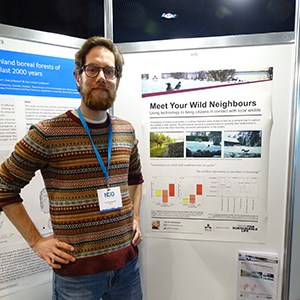Contact
Department of Wildlife, Fish and Environmental Studies

Many ecologists from the Nordic countries and elsewhere gathered in Reykjavik for the fourth conference of the Nordic Society Oikos themed ‘ecology in the Anthropocene’.
In a program filled with all ecological disciplines there was a ‘speed talks’ session on urban ecology. The six talks in this session ranged from biodiversity mapping in Helsinki to reproduction success in urban great tits in Malmö and the evolution of Daphnia in Belgian cities.
Despite the large range in topics, there was a clear overarching theme, namely that all the studied organisms have in some way adapted to living in urban environments, dealing with pollution, stress, disturbance and increased nutrients. Furthermore, it was stressed that good mapping of species distributions and timely involvement of stakeholders are important to ensure biodiversity conservation in urban areas. In a great keynote, Professor David Lusseau of the University of Aberdeen called for an increased involvement of ecologists in finding socioecological solutions to reach the sustainable development goals. As such, ecologists should talk with policy makers and stakeholders in the early stages of research programs if we want to reach the sustainable development goal of sustainable cities.
At the conference, SLU Urban Futures was represented by Tim Hofmeester, presenting his project "Meet your wild neighbours". In this project, Tim and colleagues bring the citizens of Umeå municipality in contact with their wild neighbours by borrowing camera traps. These camera traps are put out in gardens all over the municipality to see which wildlife species occur close to people. The preliminary results presented at the conference were that species richness for both mammals and birds was highest in the most urban gardens, and that most participants participated to increase their own knowledge and experience.
- It was great to meet others working on urban ecology in the Nordic countries. Several were enthousiastic about the project and we started chatting about potential collaboration in the future. Such networking opportunities are why I think going to conferences and presenting your work is so important, says Tim Hofmeester.
The project will continue to get at least a year of data and was funded by SLU Urban Futures.
Read more about the project "Meet your wild neighbours" - www.slu.se/vildagrannar (only in Swedish)